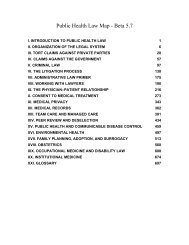Healing a Broken World - Society of Jesus
Healing a Broken World - Society of Jesus
Healing a Broken World - Society of Jesus
You also want an ePaper? Increase the reach of your titles
YUMPU automatically turns print PDFs into web optimized ePapers that Google loves.
<strong>Healing</strong> a <strong>Broken</strong> <strong>World</strong><br />
future generations cannot be diminished. It is clear that our planet is indeed<br />
threatened, and that the current economic model is self-defeating unless we<br />
decide to act so as to reverse a bleak and harmful future for millions <strong>of</strong><br />
people. This places the ecological crisis in a wider inter-generational context.<br />
Hitherto, the understanding <strong>of</strong> environmental problems caused by human<br />
activities was related to local events: for example, pollution <strong>of</strong> rivers,<br />
deforestation, exhaustion <strong>of</strong> fisheries, or landslides set <strong>of</strong>f by interventions<br />
on the territory. The damage was done locally and the remedy, it was<br />
thought, should be applied equally locally: water treatment, forest<br />
regeneration etc. Now, however, climate change and ozone layer depletion<br />
show a new face to the ecological crisis: local actions have a global effect.<br />
The whole planet is under threat and only a response from all can be really<br />
effective.<br />
15] The ecological crisis also challenges our faith. It is the very dream <strong>of</strong> God<br />
as creator that is threatened. It is the entire world, the one God put in the<br />
hands <strong>of</strong> humankind to keep and preserve, which is in real danger <strong>of</strong><br />
destruction. This is not an apocalyptical message but a very real possibility if<br />
we stick to our ‗business as usual‘ attitude and refuse to act with conviction<br />
and strength. The first victim is the Earth, the resources that it contains and<br />
that are destined for present and future generations. Special mention must<br />
be made first <strong>of</strong> biodiversity, the loss <strong>of</strong> which is irreversible and<br />
dramatically reduces the richness <strong>of</strong> nature. Next among the victims are the<br />
poorest <strong>of</strong> this world. 16<br />
16] The ecological crisis threatens the livelihood <strong>of</strong> all people, especially the<br />
poor and most vulnerable: they live in increasingly fragile contexts<br />
characterized mainly by natural hazards, changing climatic conditions,<br />
pollution, deforestation, desertification and soil exhaustion. Diminishing<br />
access to natural resources makes livelihood management more difficult;<br />
disasters such as flooding, fire or chemical pollution can suddenly push a<br />
family into extreme poverty. The poor, in relying on natural resources more<br />
heavily, feel themselves to be more vulnerable to environmental change.<br />
Despite their knowledge <strong>of</strong> seasonal conditions, poor people, limited in<br />
resources by their socio-economic condition, are unable to prepare<br />
themselves for the consequences <strong>of</strong> diminishing natural resources and to<br />
respond to the speed <strong>of</strong> change. Unsanitary conditions and a poor working<br />
environment are obviously contributors to poor health. In urban areas in<br />
particular, pollution <strong>of</strong> water sources, flooding <strong>of</strong> houses and lack <strong>of</strong><br />
Page 19 ■
















